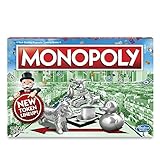
Components
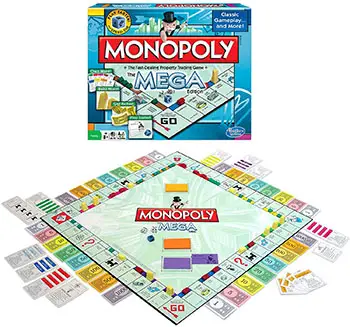
- Quad-fold gameboard
- 32 houses
- 12 hotels
- 8 skyscrapers
- 4 depots
- 10 tokens
- 37 title deeds
- 16 chance and community chest cards
- 16 bus tickets
- 2 dice
- 1 speed die
- money
- tray
- instructions.
What's different in this Edition
Money
Each player begins with $2500, including a crisp new $1000 bill, in addition to the standard five each $1's, $5's, $10's, six each $20's, and two each $50's, $100's & $500's.
Game Play
Roll only the two white dice to determine your playing order.
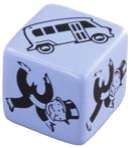
On your turn, roll all THREE dice: the two white dice plus the new speed die.
-
If pips appear on all three dice, simply move the total of all three.

-
If you roll a Mr. Monopoly, you get a bonus move.
First, move according to the white dice, do what you would normally do on that space; then move again to the next unowned property, which you may now buy.
If you roll a Mr. Monopoly after all of the properties are owned, make a normal move according to the white dice, then move ahead to the first property on which you need to pay rent. If all other players properties are mortgaged, stay where you are.
Note: An opponent can't build or trade until your Mr. Monopoly move is completed.
-
If you roll the Bus, first make a normal move according to the white dice, then decide to either take a BUS TICKET for later use (usually a good idea if any tickets are left in the deck) or move again to the nearest Chance/ Community Chest space in front of your token.
Doubles & Triples
Refer only to the white dice when determining doubles. If
doubles entitle you to roll again, you may use a Bus Ticket in place of rolling the dice. While in JAIL, roll only the two white dice (if you pay beforehand to get out, roll all three dice).
If you roll TRIPLE 1's, 2's, or 3's, move ahead to ANY space on the board. Do not roll again. You do not go to Jail if you've rolled doubles twice before rolling triples.
New Properties & Skyscrapers
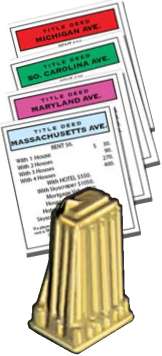
Each color group has one additional property. You may build houses and hotels once you own all but one property in a color group. If you own all of the properties of a color group, and have built hotels on each, you may then build skyscrapers.
Refer to the property's Title Deed for the cost of a Skyscraper as well as the amount of rent you can collect from having one here.
Note: you are entitled to collect TRIPLE rent on any unimproved property in a group once you own all of its properties. You may not mortgage any property of a group until all houses on it are sold back to the bank.
If you acquire the final property of a group, after previously building on its other properties, you must un-mortgage this property immediately (if mortgaged) and build it up according to the "even" building rule or, if you can't afford to do so, you must redistribute existing houses among all properties of the group.
You may need to break down hotels to do this. You may sell a Skyscraper back to the bank for half its value and revert to a hotel.
Railroads
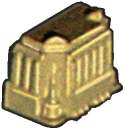
You may improve your Railroads by building a TRAIN DEPOT on it (cost: $100). A train depot doubles the rent due for the Railroad.
You don't need to own multiple Railroads before building a TrainDepot on one. Train Depots may be sold back to the bank for $50 each.
Bus Tickets
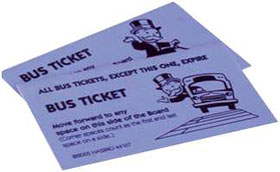
On any turn, you may choose to use a Bus Ticket (if you have any) instead of rolling the dice.
If so, move forward to any space on the same side of the board. (Corners are the final space on each side, as well as the first space of the next side).
After using a Bus Ticket, give the Ticket to the Banker, it is out of play for the remainder of the game. (There are 16 tickets in all.
When they are gone, they're gone!) Watch out! When an "All Tickets Expire" card is drawn, all other Tickets in the hands of the players are lost to the bank (they've expired). If a Bus Ticket or Mr. Monopoly roll causes you to pass GO, collect $200 as usual.
Note: All Bus Tickets should be revealed as collected and kept face up.
Other New Spaces

Auction
If you land here, pick an unowned property for the Banker to auction off.
Later in the game, when all of the properties are owned, you must move ahead to the property on which you need to pay the highest rent (the closer one, if tied).
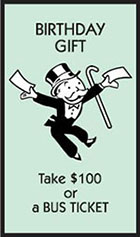
Birthday Gift
If you land here collect $100 from the Bank, or draw a Bus Ticket for use on a later turn. Your choice.
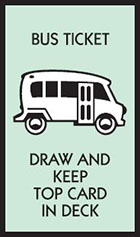
Bus Ticket
Take a Bus Ticket and keep for use on a later turn. Do nothing if no Bus Tickets remain.
Monopoly - Standard Edition Rules
Object of the Game
The object of the game is to become the richest player by buying, renting and trading properties.
Setup
Place the game board on a table, and put the Chance and Community Chest cards facedown on their allotted spaces on the board. Each player chooses one token to represent him/her while traveling around the board.
Each player is given $1,500 in cash divided as follows: two each of $500s, $100's and $50's; six $20's, five each of $10's, $5's and $1's.
All remaining cash and other equipment go to the Bank. Stack the Bank's cash on edge in the compartments in the plastic Banker's tray.
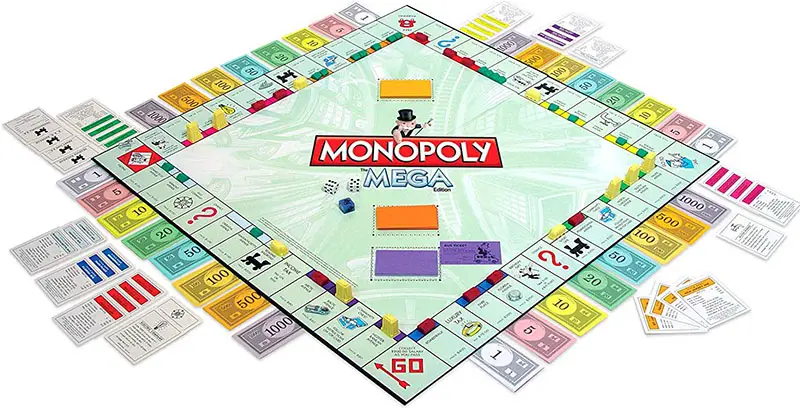
Banker
Select as Banker a player who will also make a Auctioneer. A Banker who plays in the game must his/her personal cash separate from that of the Bank.
When more than five people play, the Banker may elect to act only as Banker Auctioneer.
The Bank
Besides the cash, the also holds all Title cards, as well as buildings prior to use by the players.
The Bank pays to salaries and bonuses. It sells and auctions properties and hands out their proper Title Deed cards; it sells buildings to the players and loans cash when required on mortgages.
The Bank collects all penalties, loans, and interest, and the value of all properties that it sells and auctions. The Bank never "goes broke". If the Bank runs out of cash, the Banker may issue as much money as may be needed by merely writing on any ordinary paper.
Game Play
Starting with the Banker, each player in turn rolls the dice. The player with the highest total starts the play. Place your token on the corner marked "GO", roll the dice and move your token, in the direction of the arrow, the number of spaces indicated by the dice.
After you have completed your play, the turn passes to the left. The token remains on the space occupied and proceeds from that point on the player's next turn. Two or more tokens may rest on the same space at the same time.
According to the space your token reaches, you may be entitled to buy a property-or be obliged to pay rent, pay penalties, draw a Chance or Community Chest card, "Go to Jail", etc.
If you roll doubles, you move your token as usual, the sum of the two dice, and are subject to any privileges or penalties pertaining to the space on which you land. Retaining the dice, roll again and move your token as before.
If you roll doubles three times in succession, move your token immediately to the "In Jail" part of the "IN JAIL - JUST VISITING" corner space (see JAIL).
Go
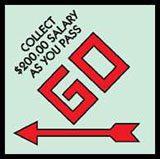
Each time a player's token lands on or passes over GO, whether by rolling the dice or by drawing a card, the Banker pays him/her a salary of $200. The $200 is paid only once each time around the board.
However, if you pass GO on the roll of the dice and land two spaces beyond it on the Community Chest space, or nine spaces beyond it on the
Chance space, and you draw an "ADVANCE TO GO" card, you collect $200 for passing GO the first time and another $200 for reaching it the second time by instructions on the card.
Buying Properties
Whenever you land on an unowned property you may buy it from the Bank at its printed value. You receive the Title Deed card showing ownership of this property; place it faceup in front of you.
If you do not wish to buy the property, the Banker auctions it to the highest bidder. The buyer pays to the Bank the amount of the bid, in cash, and receives the corresponding Title Deed card.
Any player, including the one who declined the option of buying the property at the printed value, may bid. Bidding may start at any price.
Paying Rent
When you land on a property owned by another player, the owner collects rent from you in accordance with the list printed on its Title Deed card. If the property is mortgaged, no rent can be collected.
When a property is mortgaged, its Title Deed card is placed facedown in front of the owner (see MORTGAGES). It is an advantage to own all of the Title Deed cards in a color group because the owner may then charge double rent for unimproved properties in that color-group.
This rule applies to un-mortgaged properties even if another property in that color-group is mortgaged. It is even more advantageous to have buildings on properties because rents are much higher than for unimproved properties.
The owner may not collect the rent if he/she fails to ask for it before the second player following rolls the dice.
Chance & Community Chest Cards
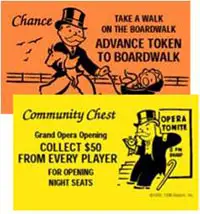
When you land on either a Chance or Community Chest space, take the top card from the deck indicated, follow the instructions and return the card facedown to the bottom of the deck.
The "GET OUT OF JAIL FREE!" cards are held until used and then returned to the bottom of the deck.
If the players who draw these do not wish to use them, they may sell them, at any time, to another player for an amount agreeable to both.
Income Tax
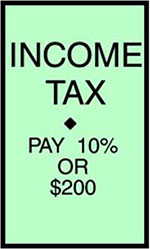
If you land on the "INCOME TAX Pay 10% or $200" space you have two options:
You may estimate your penalty at $200 in cash and pay the Bank, or you may pay 10% of your total worth to the Bank.
Your total worth is all your cash on hand, the printed values of mortgaged and unmortgaged properties and the cost of all the buildings you own.
You must decide which option you will take before you add up your total worth.
Jail
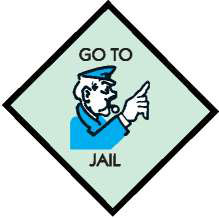
You land in Jail when
- your token lands on the space marked "Go to Jail";
- you draw a card marked "GO DIRECTLY TO JAIL"; or
- you roll doubles three times in succession
When you are sent to Jail you cannot collect your salary of $200 in that move since, regardless of where your token is on the board, you must move it directly into Jail.
Your turn ends when you are sent to Jail. If you are not "sent" to Jail but in the ordinary course of play land on that space, you are "Just Visiting", you incur no penalty, and you move ahead in the usual manner on your next turn.
You Get out of Jail By
-
Rolling doubles on any of your next three turns; if you succeed in doing this you immediately move forward the number of spaces shown by your doubles roll. Even though you rolled doubles, you do not take another turn.
-
Using a "GET OUT OF JAIL FREE!" card if you have one.
-
Purchasing a "GET OUT OF JAIL FREE!" card from another player and playing it.
-
Paying a fine of $50 before you roll the dice on either of your next two turns.
If you don't roll doubles by your third turn, you must pay the fine of $50. You then get out of Jail and immediately move forward the number of spaces shown by your roll. Even though you are in Jail, you may buy properties from or sell them to other players, buy or sell buildings and collect rents.
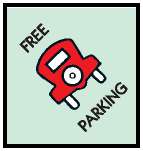
Free Parking
A player landing on this space receives no cash, properties or rewards of any kind. This is just a "free" resting place.
Houses
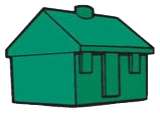
When you own all of the properties in a color-group you may buy houses from the Bank and place them on those properties. If you buy one house, you may place it on any one of those properties.
The next house you buy must be placed on one of the unimproved properties of this or any other complete color-group you may own. The price you must pay the Bank for each house is shown on your Title Deed card for the property on which you place the house.
The owner still collects double rent from an opponent who lands on the unimproved properties of his/her complete color-group. Following the above rules, you may buy and place at any time as many houses as your judgment and cash will allow.
You must place them evenly, i.e., you cannot place more than one house on any one property of any color-group until you have placed one house on every property of that group.
You may then begin on the second row of houses, and so on, up to a limit of four houses to a property. For example, you cannot place three houses on one property if you have only one house on another property of that group.
As you place evenly, you must also break down evenly if you sell houses back to the Bank.
Hotels
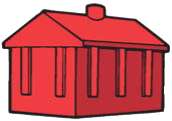
When you have four houses on each property of a complete color-group, you may buy a hotel from the Bank and place it on any property of the color-group.
You return the four houses from that property to the Bank and pay the value of the hotel as shown on the Title Deed card. You may place only one hotel on any one property.
Building Shortages
When the Bank has no buildings to sell, players wishing to buy them must wait for some player to sell his/hers back to the Bank.
If there are a limited number of buildings available and two or more players wish to buy more than the Bank has, the buildings must be sold at auction to the highest bidder.
Selling Properties
Unimproved properties (but not buildings) may be sold to any player as a private transaction for any amount the owner can get. However, no properties can be sold to another player if buildings are placed on any properties of that color-group.
Any buildings so located must be sold back to the Bank before the owner can sell any property of that color-group. Buildings may be sold back to the Bank at any time for one-half the amount paid for them.
All houses on one color-group must be sold one by one, evenly, in reverse of the manner in which they were built. All hotels on one color-group may be sold at once. Or they may be sold one house at a time (one hotel equals five houses), evenly, in reverse of the manner in which they were built.
Mortgages
Unimproved properties can be mortgaged through the Bank at any time. Before an improved property can be mortgaged, all of the buildings on all of the properties of its color-group must be sold back to the Bank at half price.
The mortgage value is printed on each Title Deed card. No rent can be collected on mortgaged properties, but rent can be collected on un-mortgaged properties in the same group. In order to lift the mortgage, the owner must pay the Bank the amount of the mortgage plus 10% interest.
When all of the properties of a color-group are no longer mortgaged, the owner may begin to buy back buildings at full price. The player who mortgages a property retains possession of it and no other player may secure it by lifting the mortgage from the Bank.
However, the owner may sell this mortgaged property to another player at any agreed upon price. If you are the new owner, you may lift the mortgage at once if you wish by paying off the mortgage plus 10% interest to the Bank.
If the mortgage is not lifted at once, you must pay the Bank 10% interest when you buy the property and if you lift the mortgage later you must pay the Bank an additional 10% interest as well as the amount of the mortgage.
Bankruptcy
You are declared bankrupt if you owe more than you can pay either to another player or to the Bank. If your debt is to another player, you must turn over to that player all that you have of value and retire from the game.
In making this settlement, if you own buildings, you must return these to the Bank in exchange for cash to the extent of one-half the amount paid for them. This cash is given to the creditor.
If you have mortgaged properties, you also turn these properties over to your creditor but the new owner must at once pay the Bank the amount of interest on the loan, which is 10% of the value of the property.
The new owner who does this may then, at his/her option, pay the principal or hold the property until some later turn, then lift the mortgage. If he/she holds the property in this way until a later turn, he/she must pay the interest again upon lifting the mortgage.
Should you owe the Bank, instead of another player, more than you can pay (because of penalties) even by selling off buildings and mortgaging properties, you must turn over all assets to the Bank.
In this case, the Bank immediately sells by auction all properties so taken, except buildings. A bankrupt player must immediately retire from the game. The last player left in the game wins.
Miscellaneous
Cash can only be loaned to a player by the Bank, and then only by mortgaging properties. No player may borrow from or lend cash to another player.
Other Monopoly Editions
- Anti-Monopoly
- Monopoly City
- Monopoly Cheaters Edition
- Monopoly Deadpool
- Monopoly Deal
- Monopoly Fortnite
- Monopoly for Millennials
- Monopoly Frozen II
- Monopoly Game of Thrones
- Monopoly Friends
- Monopoly Gamer
- Monopoly Junior
- Monopoly Junior Electronic Banking
- Monopoly Junior Party
- Ms. Monopoly
- Monopoly Marvel Avengers
- Monopoly - Longest Game Ever
- Monopoly Original
- Monopoly Peppa Pig
- Monopoly Socialism
- Monopoly Stranger Things
- Monopoly The Simpsons
- Monopoly Speed
- Monopoly Revolution
- Monopoly Star Wars
- Monopoly Toy Story
- Monopoly Ultimate Banking
- Monopoly Voice Banking
Continue Reading
